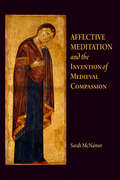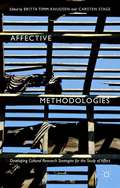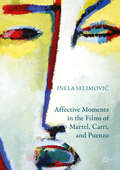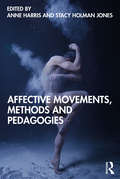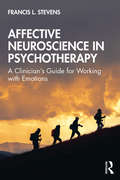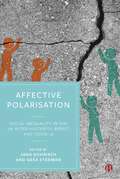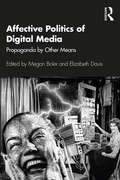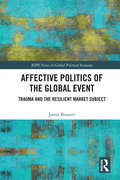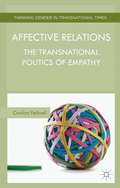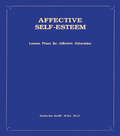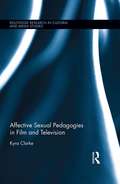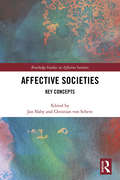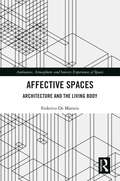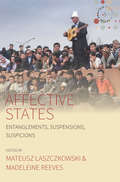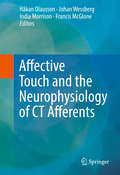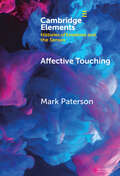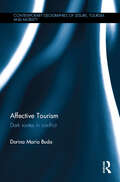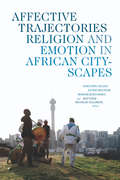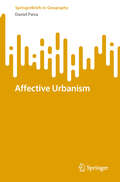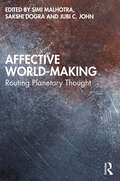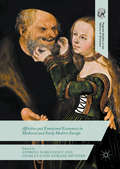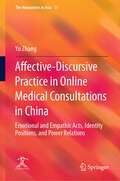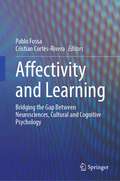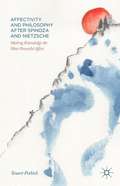- Table View
- List View
Affective Meditation and the Invention of Medieval Compassion (The Middle Ages Series)
by Sarah McNamerAffective meditation on the Passion was one of the most popular literary genres of the high and later Middle Ages. Proliferating in a rich variety of forms, these lyrical, impassioned, script-like texts in Latin and the vernacular had a deceptively simple goal: to teach their readers how to feel. They were thus instrumental in shaping and sustaining the wide-scale shift in medieval Christian sensibility from fear of God to compassion for the suffering Christ.Affective Meditation and the Invention of Medieval Compassion advances a new narrative for this broad cultural change and the meditative writings that both generated and reflected it. Sarah McNamer locates women as agents in the creation of the earliest and most influential texts in the genre, from John of Fécamp's Libellus to the Meditationes Vitae Christi, thus challenging current paradigms that cast the compassionate affective mode as Anselmian or Franciscan in origin. The early development of the genre in women's practices had a powerful and lasting legacy. With special attention to Middle English texts, including Nicholas Love's Mirror and a wide range of Passion lyrics and laments, Affective Meditation and the Invention of Medieval Compassion illuminates how these scripts for the performance of prayer served to construct compassion itself as an intimate and feminine emotion. To feel compassion for Christ, in the private drama of the heart that these texts stage, was to feel like a woman. This was an assumption about emotion that proved historically consequential, McNamer demonstrates, as she traces some of its legal, ethical, and social functions in late medieval England.
Affective Methodologies: Developing Cultural Research Strategies For The Study Of Affect
by Britta Timm Knudsen Carsten StageThe collection proposes inventive research strategies for the study of the affective and fluctuating dimensions of cultural life. It presents studies of nightclubs, YouTube memes, political provocations, heritage sites, blogging, education development, and haunting memories.
Affective Moments in the Films of Martel, Carri, and Puenzo
by Inela Selimović<P>This book studies the intimate tensions between affect and emotions as terrains of sociopolitical significance in the cinema of Lucrecia Martel, Albertina Carri, and Lucía Puenzo. Such tensions, Selimović argues, result in “affective moments” that relate to the films’ core arguments. <P>They also signal these filmmakers’ novel insights on complex manifestations of memory, desire, and violence. <P>The chapters explore how the presence of pronounced—but reticent—affect complicates emotional bonding in the everydayness depicted in these films. By bringing out moments of affect in these filmmakers’ diegetic worlds, this book traces the ways in which subtle foci on gender, class, race, and sexuality correlate in these Argentine women’s films.
Affective Movements, Methods and Pedagogies
by Anne Harris and Stacy Holman JonesAffective Movements, Methods and Pedagogies invites readers to think with affect about performance, pedagogies and their inherent activist, embodied and collective natures. It works across multiple spheres to help readers understand how to deploy affective approaches rather than to simply think with affect theory about traditional methods. The book is structured and curated across three main thematic sections: affective movements, methods and pedagogies, each of which treats the core explorations of affect and performance through a different perspective. It is concerned with the ways performance and theatrical methods work with and through a theoretics of affect. The sixteen chapters include work that models theoretical practices in writing, and demonstrates how theorising affect and its methods is itself a performative practice. The contributors offer rich examples from diverse geopolitical as well as disciplinary contexts, innovative methods, and finally, intersectional theoretics. This collection will be of interest to higher education students exploring methodologies, and academic researchers and teachers in the fields of performance studies, communication, critical studies, sociology and the arts.
Affective Neuroscience in Psychotherapy: A Clinician's Guide for Working with Emotions
by Francis L. StevensMost psychological disorders involve distressful emotions, yet emotions are often regarded as secondary in the etiology and treatment of psychopathology. This book offers an alternative model of psychotherapy, using the patient’s emotions as the focal point of treatment. This unique text approaches emotions as the primary source of intervention, where emotions are appreciated, experienced, and learned from as opposed to being regulated solely. Based on the latest developments in affective neuroscience, Dr. Stevens applies science-based interventions with a sequential approach for helping patients with psychological disorders. Chapters focus on how to use emotional awareness, emotional validation, self-compassion, and affect reconsolidation in therapeutic practice. Interventions for specific emotions such as anger, abandonment, jealousy, and desire are also addressed. This book is essential reading for clinicians practicing psychotherapy, social workers and licensed mental health counselors, as well as anyoe interested in the emotional science behind the brain.
Affective Polarisation: Social Inequality in the UK after Austerity, Brexit and COVID-19
by Jana Gohrisch and Gesa StedmanInequality is an ever-present danger in our society. This important book addresses the crucial nexus between the lived experience of inequality and how it shapes political responses. With contributors from the UK and Continental Europe, the book compiles case studies with theoretically informed discussions of the relationship between affective polarisation, social inequality and the fall-out from Brexit and COVID-19. Using a broad concept of social inequality, the book incorporates aspects of economy and society, language, and emotion culture, as well as interviews and film in historical and transnational perspectives. The contributors offer a powerful examination of the ways in which the politics of the UK and the lived experiences of its residents have been reframed in the first decades of the 21st century.
Affective Politics of Digital Media: Propaganda by Other Means
by Megan BolerThis interdisciplinary, international collection examines how sophisticated digital practices and technologies exploit and capitalize on emotions, with particular focus on how social media are used to exacerbate social conflicts surrounding racism, misogyny, and nationalism. Radically expanding the study of media and political communications, this book bridges humanities and social sciences to explore affective information economies, and how emotions are being weaponized within mediatized political landscapes. The chapters cover a wide range of topics: how clickbait, "fake news," and right-wing actors deploy and weaponize emotion; new theoretical directions for understanding affect, algorithms, and public spheres; and how the wedding of big data and behavioral science enables new frontiers of propaganda, as seen in the Cambridge Analytica and Facebook scandal. The collection includes original interviews with luminary media scholars and journalists. The book features contributions from established and emerging scholars of communications, media studies, affect theory, journalism, policy studies, gender studies, and critical race studies to address questions of concern to scholars, journalists, and students in these fields and beyond.
Affective Politics of the Global Event: Trauma and the Resilient Market Subject (RIPE Series in Global Political Economy)
by James BrassettMarket life is increasingly conducted in the shadow of global events like 9/11, the Sub-Prime crisis and Brexit. Within International political economy (IPE) two broad positions can be discerned: either the event is ‘just an event’, a superficial spectacle in an otherwise straightforward story of power and hierarchy; or the event is large enough to be considered a ‘crisis’. While sympathetic to such arguments, this book develops a more performative politics of the global event, arguing that the very idea of the event must be placed in question. How is the event constructed? How are market subjects performed in relation to the event? This book argues that emotional and psychological discourses of ‘trauma’ and ‘resilience’ provide an important affective register for understanding how the global event is ‘known’, how it is governed, and how the affective dimensions of market life might be lived. By identifying the contingent rise of these discourses, the author de-stabilises and re-politicises the apparent existential veracity of the global event. The critical possibilities and limits of the affective turn in market life can then be rendered according to classic questions of IPE: who wins, who loses, and how might it be changed? An important work for advanced scholars and students of international political economy, ‘everyday and cultural political economy’, crisis and resilience, as well as broader debates on globalisation.
Affective Relations
by Carolyn PedwellExploring the ambivalent grammar of empathy where questions of geo-politics and social justice are at stake - in popular science, international development, postcolonial fiction, feminist and queer theory - this book addresses the critical implications of empathy's uneven effects. It offers a vital transnational perspective on the 'turn to affect'.
Affective Self-Esteem: Lesson Plans For Affective Education
by Katherine KrefftFirst published in 1993. Routledge is an imprint of Taylor & Francis, an informa company.
Affective Sexual Pedagogies in Film and Television (Routledge Research in Cultural and Media Studies)
by Kyra ClarkePopular film and television hold valuable potential for learning about sex and sexuality beyond the information-based model of sex education currently in schools. This book argues that the representation of complicated—or "messy"—relationships in these popular cultural forms makes them potent as affective pedagogical moments. It endeavours to develop new sexual literacies by contemplating how pedagogical moments, that is, fleeting moments which disrupt expectations or create discomfort, might enrich the available discourses of sexuality and gender, especially those available to adolescents. In Part One, Clarke critiques the heteronormative discourses of sex education that produce youth in particularly gendered ways, noting that "rationality" is often expected to govern experiences that are embodied and arguably inherently incoherent. Part Two explores public intimacy, contemplating the often overlapping and confused boundaries between public and private.
Affective Societies: Key Concepts (Routledge Studies in Affective Societies)
by Jan Slaby Christian Von ScheveAffect and emotion have come to dominate discourse on social and political life in the mobile and networked societies of the early 21st century. This volume introduces a unique collection of essential concepts for theorizing and empirically investigating societies as Affective Societies. The concepts promote insights into the affective foundations of social coexistence and are indispensable to comprehend the many areas of conflict linked to emotion such as migration, political populism, or local and global inequalities. Adhering to an instructive narrative, Affective Societies provides historical orientation; detailed explication of the concept in question, clear-cut research examples, and an outlook at the end of each chapter. Presenting interdisciplinary research from scholars within the Collaborative Research Center "Affective Societies," this insightful monograph will appeal to students and researchers interested in fields such as affect and emotion, anthropology, cultural studies, and media studies.
Affective Spaces: Architecture and the Living Body (Ambiances, Atmospheres and Sensory Experiences of Spaces)
by Federico De MatteisThis book explores the notion of affective space in relation to architecture. It helps to clarify the first-person, direct experience of the environment and how it impacts a person’s emotional states, influencing their perception of the world around them. Affective space has become a central notion in several discussions across philosophy, geography, anthropology, architecture and so on. However, only a limited selection of its key features finds resonance in architectural and urban theory, especially the idea of atmospheres, through the work of German phenomenologist Gernot Böhme. This book brings to light a wider range of issues bound to lived corporeal experience. These further issues have only received minor attention in architecture, where the discourse on affective space mostly remains superficial. The theory of atmospheres, in particular, is often criticized as being a surface-level, shallow theory as it is introduced in an unsystematic and fragmented fashion, and is a mere "easy to use" segment of what is a wider and all but impressionistic analytical method. This book provides a broader outlook on the topic and creates an entry point into a hitherto underexplored field. The book’s theoretical foundation rests on a wide range of non-architectural sources, primarily from philosophy, anthropology and the cognitive sciences, and is strengthened through cases drawn from actual architectural and urban space. These cases make the book more comprehensible for readers not versed in contemporary philosophical trends.
Affective States: Entanglements, Suspensions, Suspicions
by Madeleine Reeves Mateusz LaszczkowskiIn recent years, political and social theory has been transformed by the heterogeneous approaches to feeling and emotion jointly referred to as 'affect theory'. These range from psychological and social-constructivist approaches to emotion to feminist and post-human perspectives. Covering a wide spectrum of topics and ethnographic contexts-from engineering in the Andes to household rituals in rural China, from South African land restitution to migrant living in Moscow, and from elections in El Salvador to online and offline surveillance among political refugees from Uzbekistan and Eritrea-the chapters in this volume interrogate this 'affective turn' through the lens of fine-grained ethnographies of the state. The volume enhances the anthropological understanding of the various ways through which the state comes to be experienced as a visceral presence in social life.
Affective Touch and the Neurophysiology of CT Afferents
by Håkan Olausson Johan Wessberg India Morrison Francis McgloneCT afferents are receptors in mammalian hairy skin that fire action potentials when the skin is touched lightly which makes them particularly important in affective touch. Traditionally neuroscientific research has focused on more discriminative and haptic properties of touch that are mediated by large myelinated afferents and the coding properties and functional organization of unmyelinated CT afferents have been studied much less. The proposed volume will draw together existing knowledge in this nascent field. Separate sections will address (1) how we can measure affective touch, (2) CT structure and physiology, (3) CT processing, (4) the contribution of CTs to sexual behavior, (5) clinical relevance, (6) commercial relevance, and (7) future research considerations.
Affective Touching: Neurobiology and Technological Applications (Elements in Histories of Emotions and the Senses)
by Mark PatersonAt the end of the twentieth century the discovery of 'slow', affective touch nerves in humans known as C Tactile (CT) afferents, which are entirely separate from the faster pathways for touching objects, had huge social implications. The Swedish neuroscientists responsible formulated an “affective touch hypothesis” or “social touch hypothesis” to consider their purpose. Part I offers a history of the science of social touch, from related discoveries in mammals by physiologists in the 1930s, to the recent rediscoveries of the CT nerves in humans. Part II considers how these findings are being intentionally folded into technologies for interaction. First, as mediated social touch, communicating at a distance through haptics. Second, with the increasing number of social and service robots in health care and domestic settings, the role of affective touch within human-robot interaction design.
Affective Tourism: Dark routes in conflict (Contemporary Geographies of Leisure, Tourism and Mobility)
by Dorina Maria BudaThis book brings together, explores and expands socio-spatial affect, emotion and psychoanalytic drives in tourism for the first time. Affect is to be found in visceral intensities and resonances that circulate around and shape encounters between and amongst tourists, local tourism representatives and places. When affect manifests, it can ‘take shapes’ in the form of emotions such as fun, joy, fear, anger and the like. When it remains a visceral force of latent bodily responses, affect overlaps with drives as expounded in psychoanalysis. The aim of the title, therefore, is to explore how and in what ways affects, emotions and drives are felt and performed in tourism encounters in places of socio-political turmoil such as Jordan, Palestine/Israel, with a detour to Iraq. Affective Tourism is highly innovative as it offers a new way of theorising tourism encounters bringing together, critically examining and expanding three areas of scholarship: affective and emotional geographies, psychoanalytic geographies and dark tourism. It has relevance for tourism industries in places in the proximity of ongoing conflicts as it provides in-depth analyses of the interconnections between tourism, danger and conflict. Such understandings can lead to more socio-culturally and politically-sustainable approaches to planning, development and management of tourism. This ground breaking book will be of valuable reading for students and researchers from a number of fields such as tourism studies, geography, anthropology, sociology and Middle Eastern studies.
Affective Trajectories: Religion and Emotion in African Cityscapes (Religious Cultures of African and African Diaspora People)
by Hansjörg Dilger Marian Burchardt Matthew Wilhelm-Solomon Astrid BochowThe contributors to Affective Trajectories examine the mutual and highly complex entwinements between religion and affect in urban Africa in the early twenty-first century. Drawing on ethnographic research throughout the continent and in African diasporic communities abroad, they trace the myriad ways religious ideas, practices, and materialities interact with affect to configure life in urban spaces. Whether examining the affective force of the built urban environment or how religious practices contribute to new forms of attachment, identification, and place-making, they illustrate the force of affect as it is shaped by temporality and spatiality in the religious lives of individuals and communities. Among other topics, they explore Masowe Apostolic Christianity in relation to experiences of displacement in Harare, Zimbabwe; Muslim identity, belonging, and the global ummah in Ghana; crime, emotions, and conversion to neo-Pentecostalism in Cape Town; and spiritual cleansing in a Congolese branch of a Japanese religious movement. In so doing, the contributors demonstrate how the social and material living conditions of African cities generate diverse affective forms of religious experiences in ways that foster both localized and transnational paths of emotional knowledge.Contributors. Astrid Bochow, Marian Burchardt, Rafael Cazarin, Hansjörg Dilger, Alessandro Gusman, Murtala Ibrahim, Peter Lambertz, Isabelle L. Lange, Isabel Mukonyora, Benedikt Pontzen, Hanspeter Reihling, Matthew Wilhelm-Solomon
Affective Urbanism (SpringerBriefs in Geography)
by Daniel PaivaThe book poses key questions on the contemporary practices of experience-oriented urbanism from the perspective of the affective turn. Departing from a critique of the imposition of the experience economy on contemporary urbanism, the book seeks alternative narratives and praxis for the co-creation of experiences in the city by looking at how different urban curators play with rhythms, atmospheres, and worlds to improve their communities. In this sense, the book offers practical pathways for urbanists interested in using experience co-creation as a tool for fostering communities and fulfilling the right to the city. The book is mainly targeted to researchers, postgraduate students, and practitioners. The topic of affective urbanism is of interest to scholars in urban studies, architecture, geography, anthropology, and sociology.
Affective World-Making: Routing Planetary Thought
by Simi Malhotra Sakshi Dogra Jubi C. JohnThis volume fosters a re-imagination of the planet where it is seen not only as a resource, but also as an entity that must not be excluded from the political imperative of care and kinship. The authors go beyond the normative understanding of space by recognizing the potency of touch, where they look at somatic experiences that invite the intensity of affect. This book questions the dominance of the capitalocene through the existence of social aesthetic and records the affective encounters that facilitate the creation of planetary identity, affinity, and entanglements. With discussions on architecture, poetry, rap music, romantic literature, performance art, digital fashion, Instagram, Netflix shows, YouTube videos, moving image practices, eco-sexual movements, and graphic narratives, the chapters in this volume initiate a conversation on what it means to inhabit the world today. An important contribution, this book will be of interest to students and researchers of environmental humanities, planetary humanities, affect studies, digital humanities, and media studies, besides also being of interest to those studying interdisciplinary critical/cultural theory, Television and film studies, philosophy, and architectural theory.
Affective World-Making: Routing Planetary Thought
by Simi Malhotra Sakshi Dogra Jubi C. JohnThis volume fosters a re-imagination of the planet where it is seen not only as a resource, but also as an entity that must not be excluded from the political imperative of care and kinship. The authors go beyond the normative understanding of space by recognizing the potency of touch, where they look at somatic experiences that invite the intensity of affect.This book questions the dominance of the capitalocene through the existence of social aesthetic and records the affective encounters that facilitate the creation of planetary identity, affinity, and entanglements. With discussions on architecture, poetry, rap music, romantic literature, performance art, digital fashion, Instagram, Netflix shows, YouTube videos, moving image practices, eco-sexual movements, and graphic narratives, the chapters in this volume initiate a conversation on what it means to inhabit the world today.An important contribution, this book will be of interest to students and researchers of environmental humanities, planetary humanities, affect studies, digital humanities, and media studies, besides also being of interest to those studying interdisciplinary critical/cultural theory, Television and film studies, philosophy, and architectural theory.
Affective and Emotional Economies in Medieval and Early Modern Europe (Palgrave Studies in the History of Emotions)
by Andreea Marculescu Charles-Louis Morand MétivierThis book analyzes how acts of feeling at a discursive, somatic, and rhetorical level were theorized and practiced in multiple medieval and early-modern sources (literary, medical, theological, and archival). It covers a large chronological and geographical span from eleventh-century France, to fifteenth-century Iberia and England, and ending with seventeenth-century Jesuit meditative literature. Essays in this book explore how particular emotional norms belonging to different socio-cultural communities (courtly, academic, urban elites) were subverted or re-shaped; engage with the study of emotions as sudden, but impactful, bursts of sensory experience and feelings; and analyze how emotions are filtered and negotiated through the prism of literary texts and the socio-political status of their authors.
Affective-Discursive Practice in Online Medical Consultations in China: Emotional and Empathic Acts, Identity Positions, and Power Relations (The Humanities in Asia #11)
by Yu ZhangThis book provides readers with the latest research on the affective aspect of online interactions between doctors and e-patients in the context of China from a poststructuralist discourse analysis perspective. At the heart of this book is the presentation of four chapters which address (1) indirect negative emotional acts by e-patients and empathic acts by doctors (constituting “affective practice”), (2) the interactional discursive features involved in the affective practice, (3) discursive positions of e-patients and doctors within the affective practice context, and (4) power relations that are reflected in the positionings. This book sheds light on the importance of examining the affective facet of medical consultation, when it comes to identifying non-traditional positions and power relations in doctor-patient communication. It also provides the implication that e-healthcare platforms, especially those with an e-commercialized model for healthcare services, have potential to produce a type of neo-liberal discourse—the e-commercialized medical consultation discourse—in which patients and caregivers, who are acknowledged as the less powerful group in the traditional healthcare activities, are empowered and privileged.
Affectivity and Learning: Bridging the Gap Between Neurosciences, Cultural and Cognitive Psychology
by Pablo Fossa Cristian Cortés-RiveraThis book presents an interdisciplinary approach to the study of affectivity and human learning by bridging the gap between neuroscience, cultural and cognitive psychology. It brings together studies that go beyond the focus on cognitive-intellectual variables involved in learning processes and incorporate the study of the role played by affectivity and emotions in learning not only at educational settings but in all processes of transformation and human development, thus presenting affectivity as a catalyst and mediator of all daily learning processes.Chapters brought together in this contributed volume present both theoretical contributions and results of empirical research from different disciplines, such as neuroscience, cognitive psychology, cultural psychology, educational psychology, developmental psychology and philosophy, and are grouped into five thematic sections. The first part of the book brings together chapters discussing different aspects of the role played by affectivity in learning processes from the perspectives of cultural, educational and developmental psychology. The second part is dedicated to the role of affectivity for teachers during their training as educators and during their pedagogical practice in diverse contexts. The third part focuses on the relationship between affectivity and learning from a neuroscientific point of view. The fourth part discusses affectivity and learning in therapeutic and clinical contexts. Finally, the fifth part brings together chapters about affectivity and learning in everyday life.By bringing together this rich interdisciplinary collection of studies, Affectivity and Learning: Bridging the Gap Between Neurosciences, Cultural and Cognitive Psychology will be a valuable resource for researchers in the fields of psychology, neuroscience and education, as well as for educators and teachers interested in knowing more about the relationship between affectivity and human learning.
Affectivity and Philosophy after Spinoza and Nietzsche: Making Knowledge The Most Powerful Affect
by Stuart PethickPethick investigates a much neglected philosophical connection between two of the most controversial figures in the history of philosophy: Spinoza and Nietzsche. By examining the crucial role that affectivity plays in their philosophies, this book claims that the two philosophers share the common goal of making knowledge the most powerful affect.
